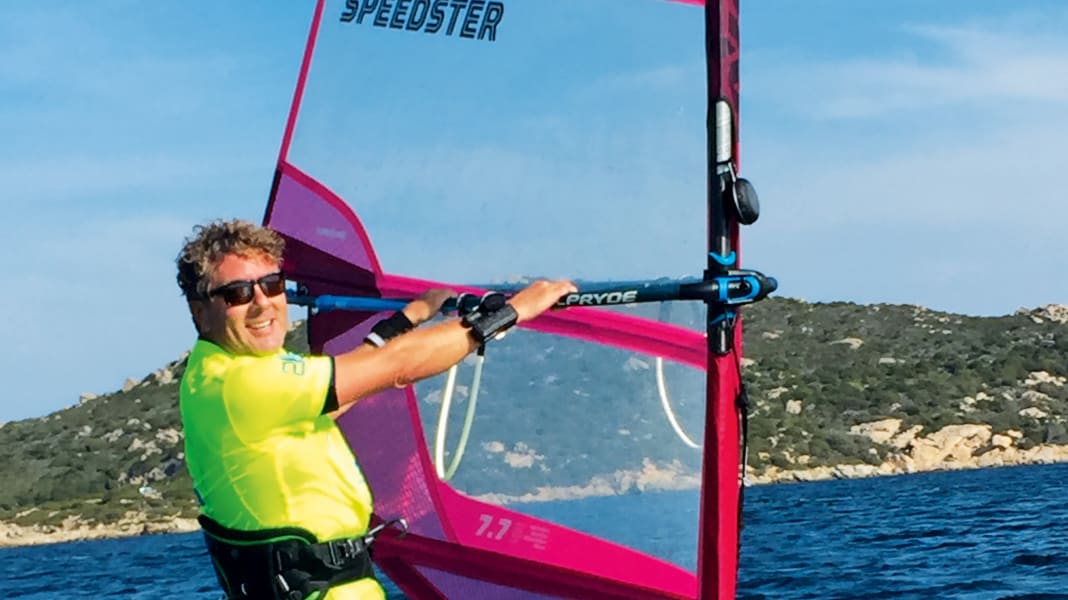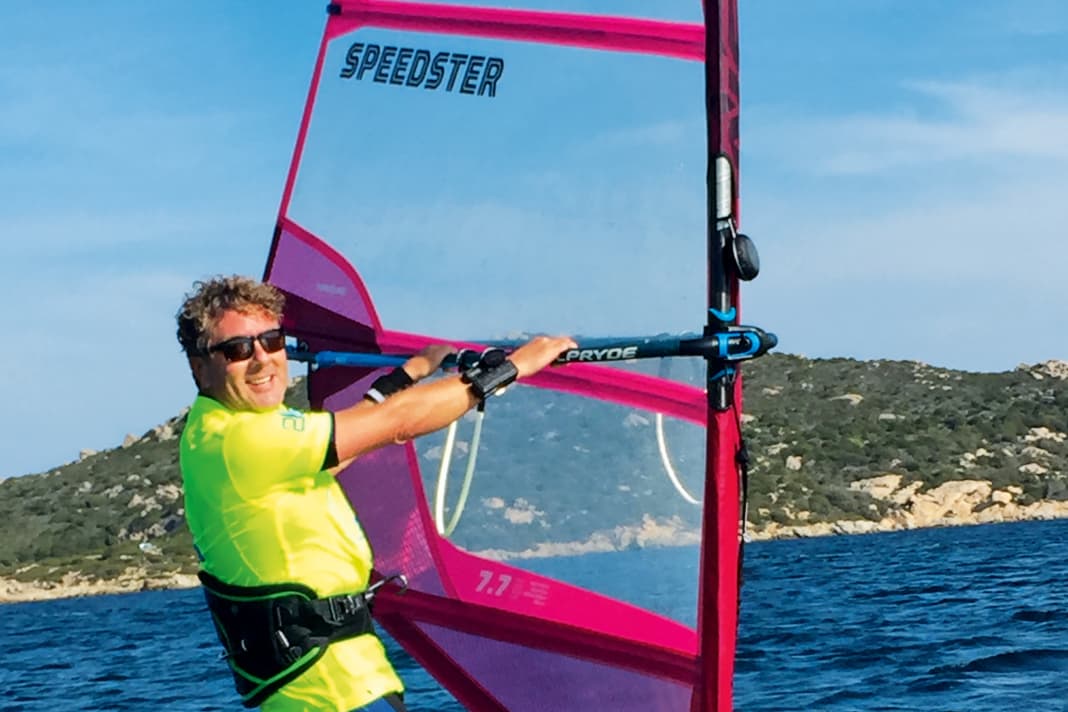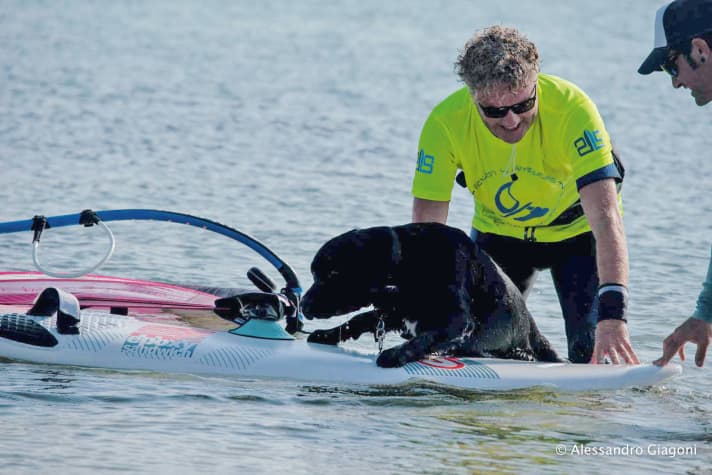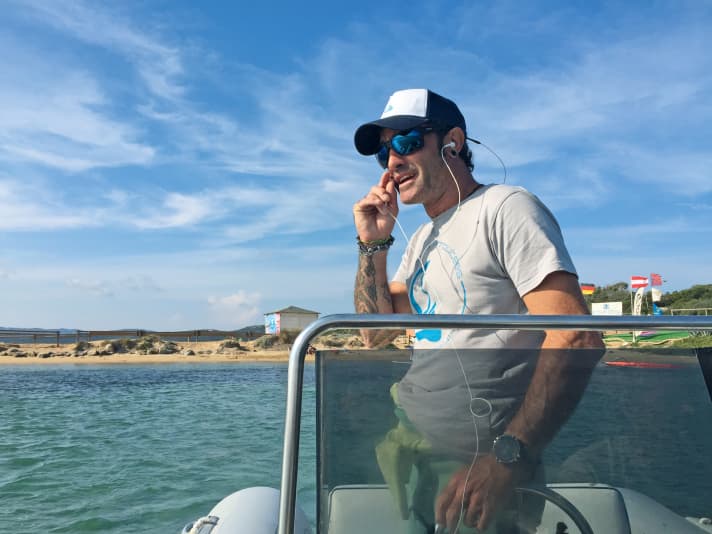
The faded flags in front of the windsurfing centre flutter in the wind, their metal hooks banging rhythmically against the flagpoles. Enrico Sulli tilts his head and listens. "That's about twelve knots," he says. He pushes the mast into the sail with routine manoeuvres, threads in ropes and lashes them tight. The board in one hand, the sail in the other, Enrico staggers to the shore, feeling his way to the water with his feet. Further out, several windsurfers are racing across the sea, the water splashing behind their boards and glistening in the sunlight. Enrico listens, he can't see them. Enrico Sulli is blind.
According to the European Blind Association Euroblind, there are 30 million blind and visually impaired people in Europe. Three out of four of those of working age are unemployed. This is also due to the fact that blind people are often underestimated in their abilities and patronised. Enrico Sulli was a regatta surfer for a long time until he went blind at the age of 44. He says: "The worst thing was the loss of my individuality. I was suddenly trapped in a category. Because everyone has a certain idea of what a blind person can and can't do." Enrico has shattered these ideas. His fight against stereotypes is representative of many.
Enrico Sulli, the blind surfer






Porto Pollo, Sardinia, European windsurfing hotspot. It's cold, the beach holidaymakers have long gone, but the surfers still come. The smell of salt water and seaweed mingles with the scent of juniper bushes in the dunes. Enrico lives on the mainland, in Ronciglione near Viterbo. He travelled there by bus, train and ferry with his guide dog Thor. When Thor is with him, Enrico's steps are long. With his white and red shorts, blond curls and sunglasses, he looks like a surfer out for a walk with his dog. Thor leads Enrico to the "Wind's Bar" behind the dunes. Rough wooden tables, squeaky green plastic chairs, surfing decorations on the walls and hippie songs coming from the speakers. Enrico banters with the waitress at the bar, has the menu read out to him and orders something he can eat with his hands.
He speaks quickly, his laughter fills the room. Enrico is aware of his effect. Thor navigates him through the chairs to a table. Enrico sits down and pours himself a Coke: he holds his "control finger" in the glass to feel when it is full. In passing, he starts to talk. In December 2005, when Enrico was 33 years old, he was diagnosed with acute glaucoma with additional macular degeneration. Increased intraocular pressure progressively destroys the optic nerve. "Operable", they say. At the time, Enrico was newly in love with a Colombian woman who already had two children. They marry, have three more children and live in a house by the lake for 13 years. Enrico earns a good living with his electrician business. He also runs a windsurfing and sailing school, a pub and a frozen yoghurt shop. "I've never been one for sitting still," he says. Enrico undergoes seven operations in seven years, six of which are fully conscious. He pushes up his sunglasses and points to the side of his blue eyes: "I watched as silicone valves were implanted in my eye. A surreal experience." His voice trembles briefly. He clears his throat, takes a deep breath and lowers his sunglasses again.
Enrico goes completely blind in 2016. Two years later, his ex-wife moves out with the children. The family dog Thor, a black Labrador puppy, stays with him. The average waiting time for a guide dog allocated by the health insurance company in Italy is two years. Enrico doesn't want to be idle for that long. Using voice control software, he researches guide dog training on the Internet. He decides to train Thor himself. Today, when Enrico says "post office", "bank", "bus", "doctor", "pharmacy" or "zebra crossing" to the dog, Thor guides him to the respective location.

Enrico also wants to go windsurfing again and enquires at the local association for the blind. He says that he was referred to swimming and told that he would have to accept the fact that he could no longer windsurf as a blind person. "I've been windsurfing all my life, the movements are memorised in me." So he tries it on his own. On the lake on his doorstep, he orientates himself by the direction from which the sun is shining in his face and the waves are slapping against the board. "I have a mental map of the lake. If I head in a certain direction and then the reeds rustle, I know exactly where I am." Enrico attaches a beeping key fob, which he switches on with his mobile phone, to a buoy near the shore so that he also knows where he has to go back to. Outside the swimming season, there is nothing going on on the lake and he assures himself that he has not endangered anyone. Thor rides along on the board, and friends or Enrico's eldest son keep an eye out on the shore for safety. "Windsurfing has always been part of my life, it gives me strength. If I had listened to the local association for the blind, I would have given up this important part of me," says Enrico looking back.
"Just as Thor isn't a 'real' guide dog on paper, I wasn't officially considered a 'real' blind person for a while," he says mockingly. Ronciglione is a small community, so word quickly spread that he was still windsurfing alone, and there were whispers in the village that he was a fraud. In 2017, Enrico applied to the social security system for a blind person's pension because he was unable to work as an electrician. He submits official medical reports and computerised eye tests prove that he can no longer see. He is summoned to a social insurance examination board. There, he says, he was asked to walk towards an eye test poster with letters of different sizes until he could recognise them; Enrico runs into the wall. A case worker also asked him about a Facebook video in which he is windsurfing alone. A few weeks later, the examination board's decision arrives in the post. Enrico is stunned: social insurance has categorised him as only slightly visually impaired. "It was about much more than the blind person's pension, it was about my lifestyle. I'm clinically blind, that's a fact. But how I live with my disability is entirely up to me," says Enrico.
He sues the social insurance company. His first lawyer had advised him to present himself unkempt in court, stumble on purpose and make a depressive impression. Enrico told him: "I'm paying you to send these people, with their idea of how a blind person should be, all to hell!". Enrico's voice trembles with anger. Thor jumps up from his chair in the Wind's Bar and looks at him scrutinisingly. "Of course I've fired that lawyer and found a new one."
In February 2019, the Viterbo Administrative Court ruled in favour of Enrico Sulli: social insurance must pay him his blind person's pension retroactively. Enrico says: "I was able to afford all this effort because I'm physically fit and had saved something during my working years. But what about blind people who can't defend themselves?"
The "2Sides Windsurf Centre" in Porto Pollo is located at the end of a headland that divides the sea into two bays. Kiters on the left, windsurfers on the right. Francesco Favettini opened the "2Sides" centre six years ago and founded the non-profit association "Corri sull'acqua" ("Walk on water"). More than 50 people with physical or mental disabilities have learnt to windsurf with Francesco. After the legal dispute, Enrico Sulli finally wants to surf on the sea again. He does some research on the internet and contacts Francesco. "I didn't have to teach Enrico anything. He's so good that he could easily take part in a normal regatta," says Francesco. Meanwhile, Enrico sets up his sail on his own in front of the windsurfing centre. He attaches a small waterproof loudspeaker to the mast, which is connected to his mobile phone. He puts the mobile phone in his wetsuit with a waterproof cover. Francesco will announce the manoeuvres to him from the motorboat via the phone connection. "Straight ahead, you have the right of way," Francesco calls into the headset.

The other surfers don't realise that Enrico doesn't see them. They cruise past him without a care in the world. When Francesco finally shouts "clear water!", Enrico looks like a racehorse before which the starting gate opens. His body tension suddenly increases, he pumps hard a few times and then glides away. Enrico enjoys the thrust and puts all his weight into the trapeze. The nose of the board slowly rises out of the sea, only his stern touches the water. Enrico's movements are a carefully coordinated choreography. Every move is perfect: he swivels the sail like a lightweight dance partner, his feet dance across the board and find their way into the footstraps of their own accord - a paso doble with the wind.
Enrico Sulli wants to use his skills to sensitise the public to stereotypes. For months, he has been planning the world's longest crossing by a blind person on a windsurfing board: 46 kilometres on the open sea, Francesco's voice in his ear. The sponsors have already been organised and the journey will begin as soon as the coronavirus pandemic allows. Francesco has also registered Enrico for the "Défi Wind" in France, they are still waiting to hear from the organisers. Enrico won't be sitting still in the meantime. He has applied for a permit in his home municipality: he wants to convert his sailing school in Ronciglione into a water sports centre suitable for the blind, with special sports equipment and beeping buoys to show the way.

